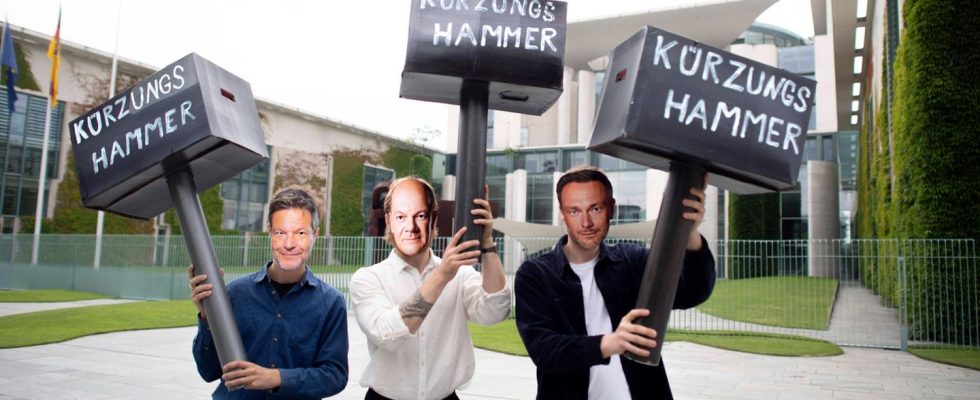Coalition struggles
Hole in the budget: is the poor now being cleared out?
Will there soon be protests again against the government’s austerity plans? Like here in July from the “Fiscal Future” initiative. At that time too, the budget situation was tense and the ministries were required to save money.
© IPON / Imago Images
After the ruling from Karlsruhe, the government is desperately looking for money. The state spends most on social spending. The first demands to make cuts here are already on the table – an overview.
Now it’s out: According to Finance Minister Christian Lindner (FDP), 17 billion euros are missing from the budget for the coming year. Where to get from? On Wednesday evening, the leaders of the SPD, Greens and FDP came together for a meeting in the Chancellery; they did not yet find a solution in the hour-and-a-half meeting.
The fronts have hardened: While representatives of the SPD and the Greens are in favor of suspending the debt brake next year in order to be able to take out loans, the Liberals vehemently reject this. For an exception to the debt brake, the coalition would again have to decide on a so-called emergency situation, which includes natural disasters or exceptional emergency situations. The FDP sees no basis for this.
For them, it’s about making savings in other areas. The state needs to handle the money “more accurately,” says Lindner. The Liberals and the opposition Union demand that social spending should also be examined. We also need to talk about “where the welfare state can make its contribution to budget consolidation,” says FDP parliamentary group leader Christian Dürr.
Scholz wants to “explore scope”
Chancellor Olaf Scholz (SPD) emphasized in his government statement on Tuesday: “The ruling of the Federal Constitutional Court does not change anything in your everyday life, here and today, regardless of whether you receive child benefit or BaföG, a pension or housing benefit.” However, he also said that they were now “exploring existing scope in the budget”, setting priorities and “of course” also limiting expenses.
It may be obvious that the federal government’s social spending is now the focus of public discussion, after all, it makes up more than a third of the budget. The Ministry of Labor and Social Affairs’ spending is expected to amount to more than 170 billion euros next year, the largest chunk for pensions and basic security in old age. That’s a lot of money.
“A constitutional budget in 2024 will not be possible without social savings,” says Jochen Pimpertz from the employer-related Institute of German Economy in Cologne (IW) – for example, the establishment of a “Generation Capital Foundation” could be postponed. Similar to the FDP, the head of the “State, Taxes and Social Security” department at the IW sees no basis for suspending the debt brake again. However, the necessary billions cannot be saved on a single item; it is a matter of “critically questioning” many individual items.
At the same time, it is clear that social cuts are not mandatory, but rather a political decision. Many of the proposals that are now circulating were already brought into play before the Federal Constitutional Court’s ruling on the debt brake – but they are more about fundamental discussions about the direction of the welfare state. Can they now urgently plug the billion dollar hole? If you take a closer look at the current demands, this is rather unlikely. The network of expenditure in this area is complex; many things cannot simply be eliminated; some things would have far-reaching effects in other areas. With some demands, things are likely to be legally difficult. An overview of the battlefield of social policy in the current budget discussion:
Citizen’s money: In the coming year, citizens’ money will increase by 12.6 percent. Even before the current budget verdict, the Union used this number to stir up sentiment against the “Hartz IV” successor. The increase, however, is explained by the high inflation. The Union itself has even agreed to the mechanism whereby the rates of citizens’ benefit are adjusted more quickly to general price increases. For the economist Achim Fraudster The demand for cuts in citizens’ benefits is therefore “theatrical thunder”. He is one of the five so-called economists who advise the federal government on economic policy. Cuts in citizens’ benefits are “constitutionally subject to narrow limits,” says the government Fraudster. The Federal Constitutional Court has emphasized in several judgments that the subsistence level that is secured with citizens’ money cannot be reduced arbitrarily. In the longer term, with regard to citizen’s benefit, it will probably be more about increasing so-called work incentives in the system so that more people work while receiving citizen’s benefit. A complicated matter – there is probably no solution to the acute budget deficit here.
Basic child protection: Another demand from the Union refers to not introducing the so-called basic child protection at all. The project by Family Minister Lisa Paus (Greens) is intended to reduce the number of children in poverty and make it easier for families to apply for benefits. However, abolishing the basic child benefit could only contribute a smaller part to the 2024 budget: the ministry is earmarking 71 million (not billion) euros for the preparation of the reform, which is not due to come into force until 2025. In the first year of 2025, Paus expects costs of 2.4 billion euros. The economy Fraudster warns against introducing basic child security: “It is a very important concern to limit child poverty,” says the scientist from the university Duisburg food. Of course, the aim must be to find the “most efficient design possible”. In the past few weeks, states and associations have voiced massive criticism of basic child welfare. Among other things, there are complaints about the bureaucratic effort that arises from the fact that the family funds are to be developed into a new family service.
Mother’s pension: The Union went into the 2013 election campaign with the “mother’s pension” and implemented this project in the government with the SPD. Since then, there has been better recognition of child-rearing periods during retirement, including for parents of children born before 1992. In the current situation, this performance “should not be set in stone,” said the Green Finance Minister from Baden-Württemberg, Danyal Bayaz. Economist Pimpertz from the IW, however, does not see any significant scope for the 2024 budget: “You cannot simply reduce the entitlements that have been granted. The mother’s pension could only be reduced for the new pension additions.” In the coming year, this will not be “a large proportion” that could make a significant contribution to reducing the budget gap. The economy Fraudster generally warns against such a step: “The mother’s pension works against poverty in old age,” says Fraudster. Women who have little income would be particularly affected by a reduction or elimination of the “mother’s pension”. “That would increase the risk of poverty rate and drive more people into basic security,” said the economist. Which in turn would increase the state’s spending on basic security.
Pension at 63: Veronika Grimm, a colleague Trugers in the Council of Economic Wise Men, can imagine putting pensions from the age of 63 up for discussion – a former pet project of the SPD and its former Labor Minister Andrea Nahles. There have already been voices from economists in the past who have called for the abolition of the pension without deductions after 45 years of contributions – if only because the pension system is likely to become increasingly burdened by demographic change. You don’t even need an acute budget crisis. Pimpertz also sees a “certain savings potential” here. But this is more likely to work in the “medium term” and not for 2024. “With a view to the situation of skilled workers, we are generally well advised to increase working lives,” said Pimpertz. “This not only relieves the burden on the pension fund, but also gives companies more options.”
Unlike economist Pimpertz, who sees at least limited scope for social spending, there are economists Fraudster Cuts in social spending are not the right way to finance investments in the future. The expenditure from the “Climate and Transformation Fund”, which has now been declared unconstitutional, was intended for this purpose. It must now be a matter of reforming the debt brake, he says Fraudsteralternatively, about anchoring a kind of “special climate fund” in the Basic Law – just as the federal government, with the support of the Union, has set up for the Bundeswehr.
Whether it’s about savings or increasing income, beats Fraudster – similar to the Greens – proposes a reduction in climate-damaging subsidies. That they want to abolish them have The SPD, Greens and FDP are actually already written into the coalition agreement. The economist also believes that a “climate solidarity” is conceivable, which could be at the same level as the current solidarity surcharge in order to finance future investments.



